An interview with the newest member of the Blue Cliff community
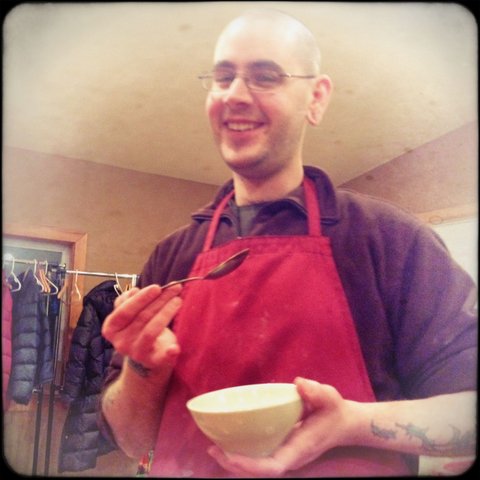
Brother Chan Troi Linh Quang (True Sky of Spritual Light) ordained on December 8, 2013 at Plum Village. He was an aspirant and is now a resident at Blue Cliff Monastery. He is 28 years old and comes from Dearing, Georgia. Brother Fulfillment and Brother Dave Kenneally (our outreach coordinator and first intern) interviewed him at Blue Cliff on January 22, 2014. We sat together on the new couch in the registration office, drinking tea and hot chocolate and chatting — we laughed a lot.
Dave: So how does young man from Georgia end up at Blue Cliff Monastery?
Here’s the short answer. I was exploring different religions, and after becoming disenchanted with western religions, a friend gave me three books: one on Hinduism, one on Buddhism and one on Taoism. The one on Buddhism was by Thay (Thich Nhat Hanh) —No Death, No Fear. I read it and immediately fell in love. Now, after eight years, I’m finally here.
Brother Fulfillment: Where there some twists and turns in there?
Yes, that was the short version! (We laugh)
Brother Fulfillment: You said that it took you eight years to come to the monastery. What kept you from coming sooner? Were you pursuing other things?
Yeah, I guess you could say that I was pursuing other things — I was pursuing a relationship! (laughs)
Actually I was planning on coming to Maple Forest when I was 23. [Maple Forest Monastery in Vermont, closed in 2007 — the monks and nuns moved to the newly opened Blue Cliff Monastery.]
I had it all planned out — I was saving my money… and then I met my friend. I decided, well, if I was really interested in monastic life, I should try this first. I wanted to make sure that a serious relationship was not something I wanted to pursue. So I went ahead with the relationship.
Brother Fulfillment: Would you say that you fell in love at that time?
Yes, I can honestly say that. I was planning on getting married. I started saving money to buy a ring. It was pretty serious. He was very loving, very supportive, especially of my practice. But the relationship ended abruptly — I found out that he cheated on me.
Brother Fulfillment: Was that painful?
Yes, you could say that!
This was the person I was planning on spending the rest of my life with. He was the only person I’d ever introduced to my family. At that time, it felt like something I couldn’t forgive. Looking back, if I had it to do again, I would probably respond in the same way, but hopefully with a little more compassion. I was very angry. But now we are very good friends again. He knows I am here and is very supportive of my practice.
Dave: What happened next?
After we broke up, I decided that I was going to spend some time being single. I wanted to make sure that I wasn’t rebounding — that it wasn’t like “oh, I was hurt, so forget it, it I’m going to live a life of celibacy.”
So I spent a couple of years trying to decide if this was what I wanted to do [monastic life]. It was during this time that got more involved with a Tibetan tradition that I already knew about. I really enjoyed this tradition and I was thinking about becoming a monk with them, but then I found out that there was a precept against practicing yoga.
Yoga was already a big part of my personal practice — I practiced mindfulness-based yoga, not devotional yoga — along the Kripalu lineage. That’s when I decided that if I couldn’t practice yoga in a Buddhist monastery, then I would look for a Hindu monastery. I found the closest possible thing that I could to Buddhism, which was the tradition of Advaita Vedanta. I started practicing and studying that and then eventually went to the Ashram [in New York] and lived there for three years.
Dave: Were you continuing to read Thay’s teaching during that time? Or had you set that aside?
I had read many books by Thay by that point, but I was mainly focusing on the practice. I felt I had absorbed a good bit of the teaching and I just needed to continue practicing. So my base was always the practice of mindfulness, especially focusing on the breath. That’s why everything that I practiced, Hatha yoga, Advaita Vedanta, everything that I practiced was based on the breath. That was my starting point.
Then I started adding a little bit on top of that. When I was at the ashram, there was a lot of drama. It was when I was in the ashram, towards the end, that I realized that I was adding all of these things on top of the practice of the breath, when it didn’t need anything else. It was perfect just the way it was.
In a way, I was just distorting it by adding all these things on top. So when I left the ashram, I figured I needed to go back to Thay, to my roots. I started reading his work again. I looked for Maple Forest but it had closed — that’s when I found Blue Cliff. The rest is history (laughs).
Dave: What was it like the first time you came to Blue Cliff?
It immediately felt like home. It felt like — I know we are supposed to go beyond concepts and ideas — but at the time it felt like the ideal monastery.
It was everything that I thought a monastery should be. The monks, and nuns, and lay friends, everybody was just overflowing with love and acceptance and care. There was a genuine desire to help, to be there for you — in a way that I hadn’t experienced before — to really be present, to really listen to you, to understand what you mean and what is going on.
Dave: Were there still obstacles that you had to overcome before you felt like ordination was the right thing?
Not really, no. Because I had already lived for three years in the ashram. I’d already lived as a monk for three years. So even thought I left the ashram, I still knew that monastic life was for me. That was not a question.
It was just a matter of finding a home. So when I came here and felt that feeling of being at home, the only obstacle was when.
Dave: You went to Plum Village to ordain. Was there something out of that experience that stands out for you?
The first thing was being surrounded by the whole Sangha during the ceremony. You’re in the center with the monks on one side and the nuns on the other, and with the chanting all around. You’re bombarded with all of this energy. It’s very, very powerful.
And then when Thay comes to you, he sprinkles your head with blessed water and puts his hand on your head. You can feel by his touch — even though it’s only his hand on your head — that you’re being embraced. It feels like your being hugged. When he cuts your hair, you recite the gatha and repeat it with him twice. When he finally snipped my hair, that was the moment it hit me that this was really happening.
When I left for Plum Village, I didn’t really feel excited, as in, like getting something new. Instead I felt a deep peace, a happiness and contentment. Something I hadn’t felt before. That was the feeling that I wanted to cultivate — it was at that moment when he cut my hair that this feeling solidified.
It was just like BAM. Not just, “Wow this is actually happening,” but this overwhelming peace. I instantly knew that it was exactly where I needed to be, at the exact moment when I needed to be there.
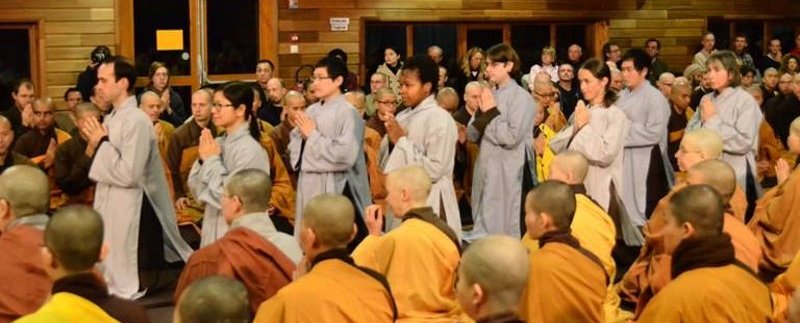
Dave: Now that you’ve been on both sides of the “brown curtain” so to speak, do you have anything that you’d like to share with people to help them better understand monastic life?
Well, first I wish they had told me that they had a water slide in the monk’s residence!
Brother Fulfillment: You’re not supposed to let that one out of the bag!
Sorry! (we laugh). One of the biggest things that I noticed — well, I had this image that monks and nuns were perfect, almost like saints. I ignored the fact that they are human beings, that they have feelings. They have difficulties that they work with. So that was one thing.
Another thing that I found really touching was the fact of how much joy there is — I feel like there’s a lot of joy. Even if there’s no talking (it tends to be pretty quiet), I always felt a deep sense of peace and joy. And when we all get together, there’s so much laughter and playfulness. I feel that is very important.
Brother Fulfillment: Are you trying to tell these people that monastic life can be fun? (laughs)
Yeah, believe it or not, I guess it can be! Not that it doesn’t have its difficulties, but the joys greatly outweigh the difficulties. Plus, even with the difficulties that I’ve experienced in my short time in monastic life, there’s so much love and support. Even though you’re having a difficulty, in a way, it seems like nothing because there’s so much support.
Brother Fulfillment: What advice would you give to young people (and those who are young at heart) who are considering the monastic path?
One of the things that was very important for me was that I had explored many different options before choosing monastic life. So coming into the path, I didn’t feel that there was anything significant that I had not yet experienced. I felt content with what I had done, I was happy. So I suggest that you make sure you are settled and you’ve done the things that you feel are important to you. Also, just come and be a part of the Sangha for a while.
There’s no need to rush into monastic life — in fact, I would counsel against that. Take your time. Be in the monastery, be with the brothers and sisters. Really experience what it’ s like. And then let it happen.
Of course, you should try to nourish your practice. If you’re interested in monastic life, really try to nourish and strengthen your practice. Because eventually, that is the most important thing. If your heart is there and you continue to strengthen your practice, you will naturally go in the right direction.
Brother Fulfillment: What about young people who may be trying to make a decision between say, graduate school or professional work and the five-year program?
If you’re looking at the five-year program, I’d say really look at your life and ask, “Can I reasonably do five years?”
But I still feel that nourishing your Bodhicitta [mind of love], nourishing your practice, and of course spending time here is the most important thing. If you’re interested in the five-year program, you should come and stay for a long time. It shouldn’t be something that you rush into.
Even though five years is not your entire life, five years is a considerable length of time.

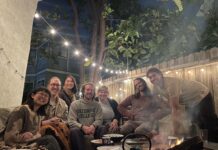








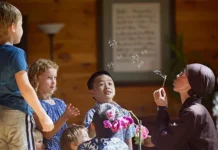






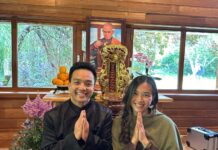
Beautiful sharing, glad to hear you are doing well there on the other side of the ocean 🙂
Wonderful interview, with indeed as much joy as I encounter every time I visit the monastery 🙂
dear brother Fullfillment,
thank you for your inspiring words. it makes me think of my visits to plum village and all the laughter and happinness i have in my life since i met Thay, in kinship, true arising equanimity , Michèle
Thank you particularly for sharing about your relationships and life before entering the monastery.
Dear Brother Linh Quang,
Thank you so much for sharing about your journey. I have felt close to you and now see that we have had some similarities in our journey. I also spent time living in an ashram (Kundalini Yoga) before finding this path. I also found that having that quiet and the path of meditation helped to open my eyes to what is really important in my life.
I am so grateful that we both have found Thay’s nourishing tradition.
Thank you for being my monastic brother.
with a bow,
Marty Soule